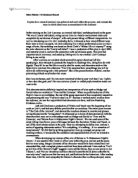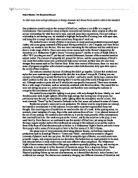Evaluate the ways in which ideas were communicated to the audience.
Our central concepts and ideas for this piece were: Search for answers, desperation, fall of economy and society, fight for survival, obligatory ignorance.
We wanted to communicate that in a downfall of the economy society will collapse; society needs money to survive, to be precise the human race needs things. Through this idea we wanted to show that once the financial system was taken away it came to down to survival of the fittest, people adapting to survive and breaking the taboo in order to do so. We also wanted to communicate that the protagonist was following his basic instincts to discover and learn, driven on a journey catalysed by the loss of his partner. As well as showing that there are often no answers, no matter how much effort and toil you are put through, we decided on showing how people can deal with what happens when they aren’t provided with what they want to know, that some people jump and take themselves out of the situation rather than having the weight of ignorance on their shoulders.
Most of the members of the group were aware of these messages, but we made sure that every single one of us portrayed them through our performances to the best of our abilities so they could be carried across to the audience, even if they didn’t recognise them straight away. A few of these messages certainly did carry across but not to the extent we would have hoped. A lot of the younger members of the audience didn’t follow the plot completely, even after an explanation of the story. The older members also admitted that it was quite difficult to digest, and that it might have needed a second viewing to reiterate the plot and distinguish the deeper messages. A couple of them said, however, that the messages seemed to sink in and play on their mind over the next week and, when thinking of the amount of content we had actually performed in 45 minutes, realised how much we had put into it and how innovative it was.







